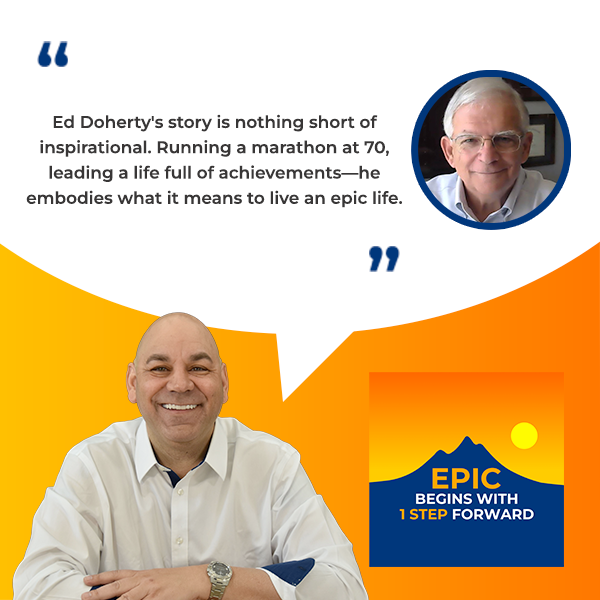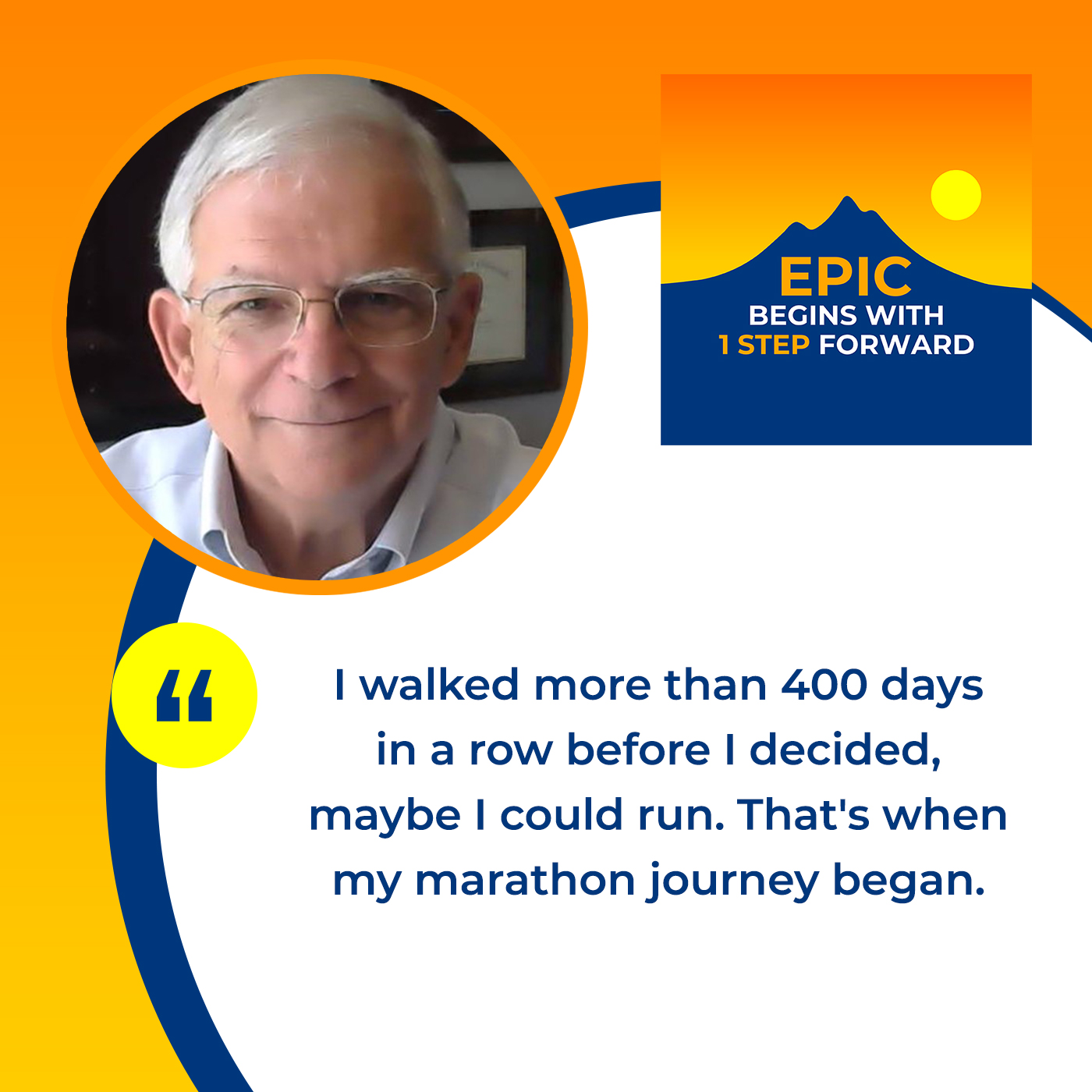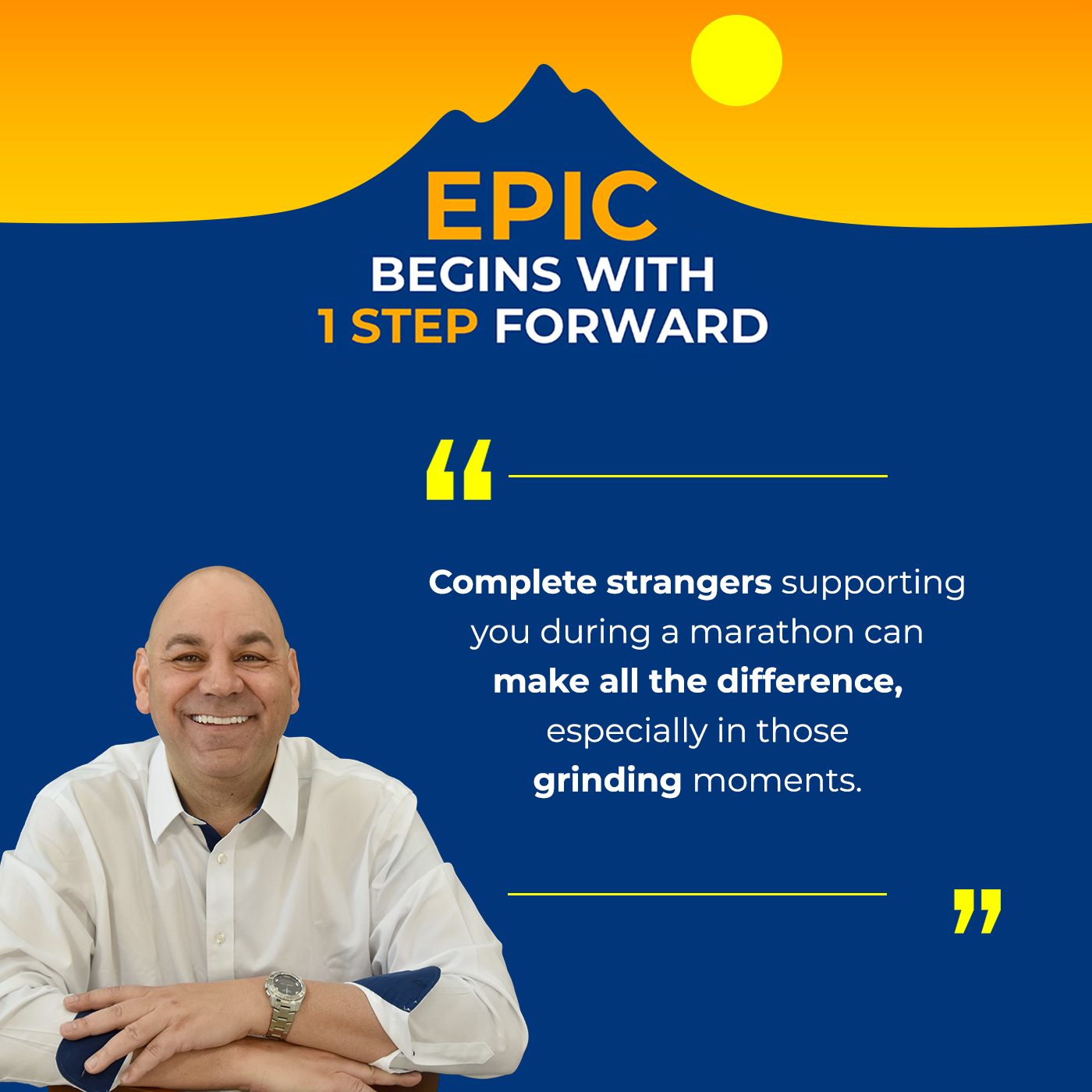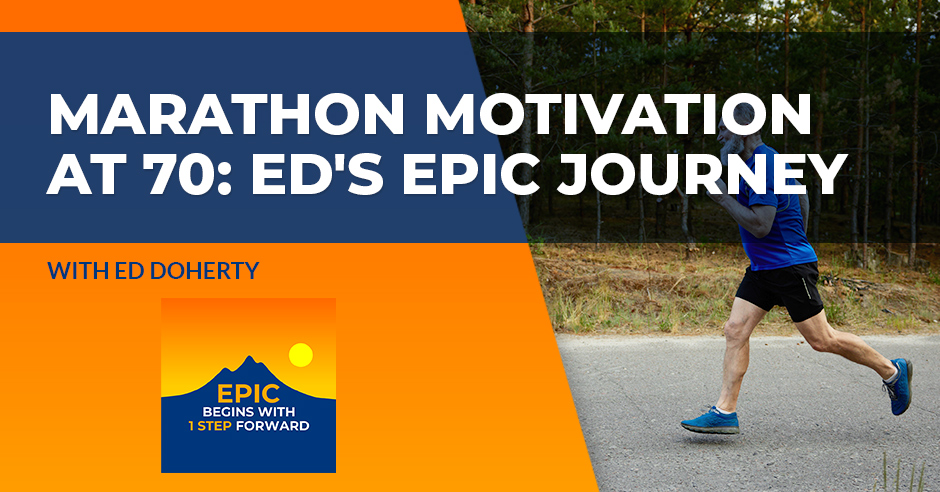Zander Sprague welcomes Ed Doherty, who embodies the true meaning of Marathon Motivation. At 70, Ed ran the Boston Marathon, proving it’s never too late to take on epic challenges. With insights into his marathon journey and the persistent mindset that helped him achieve his goals, this episode offers a powerful reminder of the value of determination and endurance. Tune in to hear Ed’s inspiring story and discover how you can find your own motivation to go the distance.
—
Watch the episode here
Listen to the podcast here
Marathon Motivation At 70: Ed’s Epic Journey With Ed Doherty
Introduction Of Ed Doherty
Welcome back to another exciting episode of the show. This is really exciting. I am joined by Ed Doherty. Ed, tell us a little about who you are and what you do.
Thank you for having me. I’m a consultant. I’ve been in the consulting business for 4 or 5 years. Prior to that, I operated a nonprofit in New England for fifteen. Prior to that, I was in the chain restaurant business since I was a teenager.
Do you want to mention what chains you might have been associated with her?
You might remember Perkins or Shoney’s. Some people have heard of McDonald’s.
A few.

Those are a couple.
Cool. Now, Ed is from, you might notice, a bit of an accident. He is from Massachusetts, as I am originally. One of the things, I don’t know if this, that you and I share, I would just cool, and I do want to talk about it because I think it’s truly epic is you have run Boston and so have I.
Speaking of starting with one step forward.
No doubt. When did you run Boston?
I think it was in 2001. I ran for the Boston Bruins Foundation and raised $13,000 as a nonprofit runner and charity sponsor. It only took me 6 hours and 18 minutes, but I was running for speed. I was running to finish.
I can tell you, not because I time qualify because this is not a Boston qualifying body, let me tell you. I’m not currently running marathons anymore. Even when I was, I got in because my younger sister did massage therapy and did post-marathon massage for Adidas and said to me offhandedly like one summer afternoon, “Would you ever want to run Boston?” Anyone who’s a marathon runner, I’m going to say most marathon runners are like, “Yes, hello.” I too got in on an exemption which was great. I ran in 2014. The year after the bombing.
My marathon was a little bit unusual in the sense that there wasn’t a Hopkinton to Boston race that year because of the pandemic. Everybody had to run a virtual marathon. My wife was very happy with that because she didn’t like the idea of me running 26.2 miles. I went to her and I said, “If I found a route where I could stop every couple of miles, do laps or something, would you be okay?” She said, “Yes.” My son, my brother, and I had a doctor. He was an obstetrician, but don’t tell my wife. I had a doctor on site and we set up a stage, a country music bar patio behind Fenway Park, and my lap was running on the streets around Fenway Park. I did 47 laps, which equaled 26.2 miles.
At 70, I ran 47 laps around Fenway Park, proving it’s never too late to chase your marathon dreams.
That’s a lot of laps.
I know. It was part of the tour because I had done some 20-mile training runs. On Jersey Street, there’s the guy who’s running a marathon at 70 years old, so I was a celebrity.
That’s really cool. I got to being way before we’d even heard of the pandemic and stuff. I got to run a Hopkins into Boston. I do have to say that for me growing up outside of Boston and then living and stuff and being a runner, honestly, Ed, one of the hardest parts, what made it truly epic was from a mile from Framingham all the way in, I already knew the course and that was really challenging because I knew where all the downhills were. I had a nightmare one night that I somehow made a wrong turn and found myself on Speen Street in Natick and I had to run up Route 9 to Wellesley and I’m trying to get through the crowd to get back on the course of Wellesley Hills. Really not a good dream, Ed. Let me tell you.
That actually happened to me. I was running a race in Worcester. It was some running festival and I was running a 5k, but I took a wrong turn. There must have been another race going on. The next thing I know, I’m running side by side with this guy and there’s a police escort. I ended up finishing second, but I have no idea how far I ran. I wasn’t much of a celebrity.
Exactly for a race that you actually didn’t enter, but okay. At least you got on the podium, man.
It’s true.
That’s good. How was your Boston experience, obviously, because of the pandemic, we’ll call it non-traditional, because you couldn’t do it. Were there people along the way cheering you on and stuff?
Interestingly enough, NBC Boston thought it’d be very interesting to cover a 70-year-old man on Marathon Day running around Fenway Park, and they did. 5.30, I have a microphone and lights in my face and then I stepped off and the problem was the Red Sox had made the playoffs and the first home game was that day. I had to finish the race and get everybody out of there before the parking went skyrocketed. There’s actually a 10-minute segment of me on NBC of running the race. What happened was because people were in town for the marathon, they saw me on TV and they came out and ran with me to make it. They made a donation to run with me because they had seen me on TV.
That’s really cool.
It was really cool.
You’ve done a lot of epic things in your life, Ed. I guess my first question for you is, you spent many years in food services, I guess is the best way to describe it. How did you get into that and choose that as one of your careers?
It’s very simple. When I was a kid, my mother used to make homemade french fries. The kind where she’d shake them in a brown paper bag with salt. One day a fast food restaurant opened up about a mile from our house and she said to me, “I bet if you worked there, you could eat french fries free.” I walked down and I got a job and I ate french fries free every day I worked it.
That’s awesome. How did it turn into a career because lots of people, I mean, I worked at a Burger King when I was in college, just to earn some money and stuff.
I did that too. I worked fast food when I was in college and then I got out of school. I didn’t have anything lined up. I was getting married and I walked into a McDonald’s, I said, “Are you hiring?” They said, “Yes.” I could work a grill. I just took a part-time job killing time while I got a job. The regional manager said, “Would you consider a career in management?” I was thinking about the notice that was going to be in the newspaper about my wedding.
It just sounded like management trainees sounded better than unemployed. I said, “Yes.” Unfortunately, a month after I started, I was in a very bad car accident. In the hospital, that same regional manager told my wife, “We’ll take care of your husband. Don’t worry about anything.” They paid me for five months and I had only worked there a month. I was very loyal and I went on to become a big shot, if you will.
I own it. I mean, if you worked your way up and we’re doing all kinds of really cool things, it’s like saying that we’re Boston Marathon finishers. Our time doesn’t matter.
One of the restaurants I was responsible for was across the street from Fenway Park. That’s where I did The All-Nighter with Larry Bird. The store was brand new. He was a rookie with the Celtics and he was doing his first TV commercial for McChicken sandwiches. Many people have seen the duel between him and Michael Jordan where they’re throwing something and bouncing. That started that night. He crumpled up his bag and threw it off the menu board. It bounced on the register and a four-year-old kid slam-dunked it into the trash bin. That was the start of the Larry Bird, Michael Jordan exercise.
That’s a great story, Ed.
During the beginning, there were all kinds of hangers-on their executives and so forth. It took until 4:00 in the morning to film it. At about 11:00, they all left. Prior to that, Larry had a Winnebago that he went to on the brakes. Once all the big shots left, he didn’t go out. He just hung on a break. He just hung around and hung with us and all the extras were employees of the restaurant. We just hung out with Larry Bird till 4:00 in the morning.
That’s really cool, Ed. That’s an awesome story. I also understand that you wrote a book. Look at you.
My book was published earlier this year. I’m 73 now. The book is a collection of my life experiences, stories like the All-Nighter with Larry Bird and the marathon of different things I’ve experienced and there’s a lesson or a message in each one of them. There are 60 stories. I joke it is absolutely perfect for an airplane ride because you can read a story while you’re waiting and then after the safety and then you can read another story and then the beverage and it’s perfect.
That’s great. Also, I assume that the stories are not so long that if you’re coming in to land and you’re like, “I got to go.” You’re not like, “No, I’m halfway through the chapter.”
It’s a pretty fast read.
That’s great. Congratulations on that.
Thank you.
I too have written some books and I know what goes into it. I know what an epic journey that whole process is. I joke about my books, that when they first came out, I actually didn’t want to read my books for a couple of months because I just read my whole book 6 or 7 times in a couple of months and doing all the editing, reading for changes and looking for errors and stuff that I got done my books. They came out and I’m like, honestly, I pick it up.
I can relate to that.
I know what I said. I’ve read it so much. I love what I said, but I don’t want to reread it again.
I hear you. I have a book right here and every now and then I’ll pick it up and look at a chapter, but I’ve read it enough.
I look at my book. I look at my book now. I’m just saying when it first came I was like, “Do I know my book?” I’ve just spent months reading it and rereading it and stuff. I know how this story ends, I just read it five times. Anyway, that’s really cool. What was it that, why did you decide to run Boston?
How Marathon Training Began
Speaking of one step forward, my wife suggested that maybe I should get off the couch and start walking one day. I’ve been married for 50 years and the one thing about me is I listened to my wife. I just walked and I walked more than 400 days in a row. One day I said, maybe I could run. I ran a hundred yards and I was like, “Whoa.” I decided, tomorrow, I’m going to run a half mile or a mile. I went, “Whoa.” I decided that I was going to take up running. I was 60 years old and I said, “I’m going to take up running.” I ran in a 5K and I was in training. Of course, I messed up my knee as all idiots who do something don’t qualify. I went to physical therapy.

My therapist, Sarah, fixed me and turned into my running coach. I said, “Bet I could do a 10K.” They had a 10K at the Patriots Stadium that finished at the 50. Talk about motivation. I did that and then I realized, “A 10k, I can run a little bit slower.” I started running 10ks and then after a couple of years, I went to Sarah and I said, “I think I can do a half marathon.” She said, “It’s about time.” I said, “Okay.” I ran a half marathon at Hampton Beach, nice and flat and then I ran another one and then I went to Sarah and I said, “I might be able to do a marathon.” She said, “Of course, you can.” I started training to run a marathon. Looking back, I find it hard to believe that I did it, but I did 500 training miles in that calendar year before running the marathon.
My wife said to start walking, and 400 days later, I began running marathons. Sometimes, the best advice is simple.
That’s great. I totally get it. My journey to being an endurance running athlete was I was working in a Fortune 100 company and really wanted to exercise. What I found was even though we had a gym I could go to for free, I was so stressed trying to get to the gym at lunchtime to do my workout to reduce my stress and I was like, “This is ridiculous.” I’m so stressed out because I’m like, “I get in there and I can go do my 20 minutes of cardio and I can get a little free weight in but then I got to quickly shower and get back to my desk because I have a meeting.”
I’d get back and I’d be like, “I’m more stressed having tried to exercise to reduce my stress.” I’m like, “What can I do?” I was traveling a bit and I’m like my manager who was a runner is like, “You can run no matter where you are. You just need shoes and whatever the appropriate clothing is and it can be a great way if you’re in a city you don’t know to explore it.”
Now theoretically that is true, Ed, but I can tell you that if you don’t know the city and you go out for a five-mile run, it’s own epic adventure. I don’t know where I started. If you’re in a country where English is not the first language and you don’t speak that language, it could be even harder to find your way back to where you were because, I don’t know, I’m in the Hilton. Which one? There are four of them but I did. I served up when I did.
I started off with a half marathon and I was like, “That’s cool.” I think you might’ve had this feeling which was perhaps you did the first 5k and you crossed the finish and you were really excited, but you asked yourself, “Now what?” That was really great but like five minutes later, you’re like now what? That’s over. That’s in the rearview mirror and then you sign up for another one. I was obviously signing up for races was motivating to keep running. Certainly, when you get up to the half marathon and marathon, I certainly was not the person like, “I’m just for fun, I’m going to go out and run fifteen miles. Just wow, that sounds great.”
Two surprises for me about running the marathon. First of all, I realized when we set goals for ourselves, we generally set easily achievable goals. I was really challenged by the marathon. I prioritization took a different step. The second thing is I was in shock at the feedback I got from people who said they were inspired by my effort. I didn’t set out to inspire anybody. I just set out to give it a shot and people kept telling me how proud they were of me. I guess maybe when I was in third grade, people told me they were proud, but I couldn’t remember too much after that. Those were the two biggest surprises.
When you set out to inspire yourself, you might end up inspiring others along the way.
Mental Strategies For Marathon Running
For the audience, if you haven’t done it, both Ed and I can attest that 26.2 miles is a really long way. I know that for me when I started doing the halves and stuff, I would mentally break the races. For Marathon, for me, the first goal was the half because then I had less. I was more than halfway done. It was mile 17 because then I only had nine miles left. It was mile 20 because well, if I made it this far, it’s only 10k more and then you get to count down. I think that chunking of it making it easier. I also found that I honestly wish on marathons they didn’t put up a mile sign until mile five because the hardest you try not to think about, you see mile two and especially with you doing laps, I don’t want to be like, only 45 more.
Let me tell you what I did to handle that mental aspect of it. I took the athletic tape and I covered the inside of both arms with the names of donors. What I did as I passed the Ted Williams statue on Lansdowne Street, I would go to the next donor and I would think about that person and my relationship for the whole mile. It was good. I still got the tape. I don’t know what I’m going to do with it.
I would hold on to it. I have to say, people ask when I say I ran Boston and stuff and someone’s like, “Was that a bucket list?” I’m like, “No, that honestly was a Holy Grail moment because I grew up watching it.” When I became a marathoner, I was like, “Of course I want to run Boston.” If I’m honest when I think about doing that turn-off of Hereford Street on Dubois-Yeltsin. I get a little misty. The one thing I can say, my cousin who qualified for Boston, ran it many times, said to me, “Look, when you turn off a Hereford and you get onto Boylston, he’s like, “You’re going to want to start to like run for it.” He’s like, “You’re not even at mile 26. It’s still a couple of blocks down.” He’s like, “Don’t do it. Otherwise, you will have made it that far and you will just burn yourself out.”
That’s sacred turf. I run in the BAA 5k and 10k and both of them go over that same ground on Turnbull and Hereford Street. Saturday before the marathon, I had walked up Boylston Street to Fenway Park. I knew exactly where the bombs went off. Every time I run it, I just stop and bow and think about it.
I obviously thought a lot about it because it was the year after when I was running, there were paved helicopters flying overhead. There were all kinds of national guards along the way. There was a heavy presence. All the people were out there supporting me. I totally agree that complete stranger support really does make a difference, especially if you’re having as one does in a marathon, what I call some of the grindy moments where the running isn’t coming as easily as one as you would hope. You’re like, “I got to just keep taking that one step forward because I’m one step closer to my goal.”

One of my favorite quotes is from Calvin Coolidge. He said, “Nothing in the world can take the place of persistence, talent will not. Nothing is more common than unsuccessful people with talent. Genius will not. Unrewarded genius is almost a proverb. Education will not. The world is full of educated derelicts. Persistence and determination alone are omnipotent.”
Persistence and determination alone are omnipotent. Talent and genius won’t guarantee success, but showing up every day will.
That’s a great quote.
I saw that on a restaurant wall when I was 21 years old. It’s always hanging wherever I’m working.
That’s great. Here’s a question, Ed. How can people find your book, are inspired by you, and want to get a hold of you? How can they get a hold of you?
The book is available on Amazon, and Barnes and Noble. It’s in both paperback and ebook. I’m going into the studio next week to record an audiobook because my friends tell me, as I talk, so I might as well talk the book. The best way to connect with me probably is on LinkedIn, Edward J. Doherty. I do a weekly web blog. I do new stories every week. The original book was a collection of 60 of my web blogs. You can find a web blog there and you can subscribe if you’d like. My website for my business is AmbroseLanden.com.
Ed, I want to thank you so much. It has been so much fun talking to a fellow Boston finisher. Certainly, you have led an epic life, and I hope that you continue to do so.
Closing Quote From Ed’s Mother
Let me end you with one quote from my mother. She was 94 years old. I used to visit her a couple of times a week. One day she looked at me after I was telling her everything that was going on, she said to me, “You lead a very interesting life and it’s all your fault.”
That’s a good one. I like that. Ed, I want to thank you so much. I want to remind everyone that if you are ready to begin your epic journey, go to EpicBegins.Com. Right now, if you go there, you can get a free e-copy of my book, EPIC Begins With 1 Step Forward: How To Plan, Achieve, and Enjoy The Journey. As always, remember, Epic choices lead to the epic life that you want.
Important Links
- Ed Doherty – LinkedIn
- Ambrose Landen – Ed Doherty’s Website
- EPIC Begins With 1 Step Forward: How To Plan, Achieve, and Enjoy The Journey

